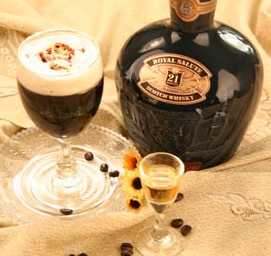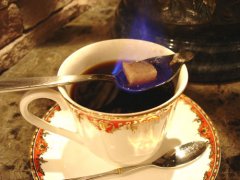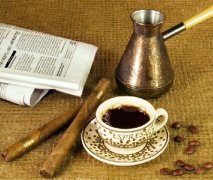Panama Flint Estate Single Bean Flavor Description Variety Growing History Production Area Treatment Introduction

For professional baristas, please follow the coffee workshop (Wechat official account cafe_style)
Panama Panama
Population: 3406000
Coffee in Panama is defined by how it is produced, not by geography. In the past, when coffee was widely cultivated, when the areas listed below were small and tightly clustered, the coffee beans could be combined into one unit.
BOQUETE
Bockett is the most famous Panamanian area. Its mountainous terrain creates many microclimates. Cool weather and frequent fog help slow the ripening of coffee cherries, similar to what some people think is a high-altitude climate.
Altitude: 400-1900m
Harvest: December-March
Breed: Typica,Caturra,Catuai, bourbon, geisha, San Ramon
VOLCAN-CANDELA
Mount Kendra produces most of the Panamanian food and some amazing coffee in this area. The region is named after the cities of Baru and Piedra Candela, which borders Costa Rica.
Altitude: 1200-1600m harvest: December-March
Breed: Typica,Caturra,Catuai, bourbon, geisha, San Ramon
RENACIMIENTO
Renacimiento is a producing area in the province of Chiriqui, bordering Costa Rica. The area itself is relatively small, so it is not the main specialty coffee producing area of Panama.
Altitude: 1100-1500m
Harvest: December-March
Breed: Typica,Caturra,Catuai, bourbon, geisha, San Ramon
Jurutungo Manor of Panama, which means "out of reach" in Spanish, is located 1850 meters above sea level on the western border of Panama and Costa Rica. Founded by Don Jos é Manuel Gallardo in 1970, it covers an area of not more than 20 hectares but is famous for its unique fertile soil and microclimate. It is famous for its perfect taste and gorgeous aroma. Unfortunately, after 2000, the owner of the manor was in poor health and the management of the manor became more and more loose, and the former famous coffee garden gradually disappeared into the smoke and grass.
Eleven years later, Graciano Cruz, the founder of the Panamanian boutique coffee industry, known as the godfather of honey processing, took a fancy to this flint manor with excellent potential, so he worked with the two daughters of the old owner Don Jose Manuel, Dafne and Damaris Gallardo, to restore the former prosperity of the manor, first to remove weeds and replant the manor to grow younger and stronger plants, and to pursue the red cherry policy of picking only red to ripe coffee fruits. According to the sweetness meter, each batch is tested to ensure the extreme sweetness of the coffee fruit, and then under the principle that Graciano Cruz never learns to use or pollute the water resources as far as possible, all the coffee fruits are dried in the sun on an elevated bed and turned regularly with artificial high frequency to avoid uneven drying for as long as 4 weeks. Finally, the completely dried fruit is stored for another 90-120 days. The whole process is time-consuming and laborious. Insist on not using mechanical drying in order to retain the sweetness of the coffee fruit, while allowing moderate fermentation of sugar to develop a complex and strong personality, just like Graciano Cruz's mantra "SWEETTTTT", processed coffee such as jade syrup is not only sweet into your mouth but also sweeter into your heart.
Kaddura of Flint Manor has made a comeback under the efforts of Graciano Cruz and others, and it remains to be seen what sparks will happen to the old classics under the skillful hands of the godfather.
Manor: Flint Manor of Panama (Finca Jurutungo)
Producing area: candlestick (Piedra Candela)
Altitude: 1850 Laurel 1980 m
Variety: Caturra (Kaddura)
Treatment: sun treatment (Natural)
Flavor description: flower, fig, peach, spice, cocoa
Jurutungo, [far away and out of reach], the name of the manor is quite poetic and was founded by Don Jose Manuel Gallardo in the 70s of last century. Located in the westernmost part of Panama, near the Costa Rican border, a place called Piedra Candela. The beans planted at that time were Catuai and Kaddura, covering an area of about 20 hectares. By the end of 1970, Jose Manuel planters had planted the last 9.8 hectares of Red Kadura (Red Caturra) and half a hectare of rose summer (Gesha). For decades, the farm has actually been well managed and produced very well.
But by 2000, Don Jose Manuel was old and in poor health, unable to manage the estate, abandoned farmland and overgrown with weeds for almost a decade. In 2011, Graciano Cruz led HiU Coffee's plan to come to Jurutungo, bought the estate, and decided to renovate the farm and give the estate a chance to bring the dead back to life.
HiU first removes the original varieties of coffee trees with poor taste, and refurbishes them to grow stronger plants on the manor, so that the ripe cherries will have a chance to become world-class coffee. HiU also set up an infrastructure in Jurutungo to handle the coffee production process according to the highest standards in the industry. Under the principle of not using it as much as possible and not polluting the environment, all the coffee was dried on an elevated bed in Africa for 3 or 4 weeks, and then the completely dried cherries were stored for another 90 to 120 days, allowing the coffee to develop a complex and strong personality.
After several years of hard work, Jurutungo has been able to produce a small amount of honey-treated and sun-cured coffee, while that half-hectare rose tree was regrafted and planted four years ago, and in 2012 it finally produced the first batch of 200lb rose, which has become a model for native old trees based on their ancient roots. Because the place where the manor is located is called [Piedra Candela] (Piedra Candela), HiU has the brand of [flint] (Firestone Geisha).
HiU coffee is a project launched by Graciano Cruz, a honey treatment expert in Panama, to help Central American farms improve the quality of coffee. HiU's guidance to farmers is not only limited to the technical level, but also from the market point of view, to find characteristics for coffee farmers, from the bean species, microclimate, national culture, treatment and other different aspects, to distinguish the selling points of specific estates. Flavor is of course the most important. Graciano will identify the key flavors that are most worthy of development for a particular coffee and define the flavor spectrum.
Flavor description: full-bodied wine, drupe, passion fruit, mango, orange, cocoa
National Panama (Panama)
Producing area flint (Piedra de Candela)
1750-1950 meters above sea level
Variety Geisha, Catuai/
Producer Graciano Cruz
GPS 8.88862 N, 82.74808 W
Packing 22.7 kg / carton in vacuum box
The fame of Flint Manor has to mention an important person-
Graciano Cruz . Perhaps you are very familiar with the status of Graciano Cruz.
As a pioneer and promoter of Panamanian sun and honey treatment
Co-founded Ninety Plus with Josseph Brodsky
Then he single-handedly founded HiU and extended its experience to many producing areas.
It also pushed the Flint Manor to the world stage.
The batch of Flint Manor we introduced this year
It is also a special reserved batch selected by us and Graciano Cruz himself.
The coffee show Graciano Cruz in November also showed up to hold a sharing party for friends in Taiwan.
Graciano Cruz is dedicated to experimenting, developing and promoting the use of almost no water sources.
Honey treatment and sun treatment to reduce the impact on the environment
In the manor he handled, all of them only produced honey treatment and solarization.
The post-processing of coffee has not consumed any precious water resources for many years.
In addition to the popular batch of sun exposure, you can't miss it.
Another sign of Graciano Cruz-honey treatment is a treasure not to be missed.
Compared with the current Taiwan market myth, there is a higher degree of fermentation.
The flavor of black honey is closer to that of the sun.
Graciano Cruz's honey treatment is a classic worthy of our careful aftertaste.
Especially the honey treatment batch of geisha / Guixia
At the same time of using honey to increase the texture thickness complexity of coffee
Give a clear account of the charm and detail of the original intention of the geisha / Rosa
Let's have fun in the cup test and have an aftertaste again and again.
The micro-climate environment here is quite different from that of Boquet.
Bogut bears the sea breeze caused by the topographic gap in the Atlantic Ocean.
Coupled with topographic changes, the microclimate is rich and the climate is very humid.
There is a rainbow hanging in the distance on the side of the sun.
It's calm here and the valley is jittery on the other side.
Or it is common to get foggy and rainy in the morning and drizzle in the sun at noon and in the evening.
But the entire Wakan region, including Santa Clara or Flint to the west, is moving forward.
The situation is very different, and the mountain barrier is deep in the north of Wakan.
The moisture in the Atlantic Ocean has become more difficult to come by the wind.
It is often cloudless and sunny.
Bypassed Mount Volcan Baru.
It makes people feel very different. And head west to the Santa Clara area.
The clear sun and dry air also seem to continue to rise.
We went to serve on the international review of Best Of Panama in May 2016.
He visited the manors in the area again.
In the manors in the Bogut area, there is still a lot of light rain in May.
The coffee trees in Santa Corala are still depressing.
It's really different, but the repression of coffee trees is also a natural cycle.
It tends to make coffee trees more concentrated in blooming and fruiting.
Maybe we vaguely feel that we can save the coffee from Clara at the moment.
Sweetness seems to have a higher trend, so let's continue to observe and verify it.
Important Notice :
前街咖啡 FrontStreet Coffee has moved to new addredd:
FrontStreet Coffee Address: 315,Donghua East Road,GuangZhou
Tel:020 38364473
- Prev

Introduction to the method of producing area for describing the Flavor of single Bean in Dome Manor of Guatemala
For the exchange of professional baristas, please follow the coffee workshop (Wechat official account cafe_style) Guatimala Guatemalan population: 15438000 Guatemala has been more successful in defining its coffee priority areas than most countries and has developed its market with very different sales models.
- Next

Introduction to the treatment method of planting and Development History of single-product Bean Flavor in Spring Manor in Colombia
For the exchange of professional baristas, please follow the Coffee Workshop (Wechat cafe_style) Colombia Colombian population: 47073000 Colombia has well-defined growing areas and the impressive variety of coffee they produce. Whether you want round, heavy coffee, refreshing, fruity (or somewhere in between), the most
Related
- Does Rose Summer choose Blue, Green or Red? Detailed explanation of Rose Summer Coffee plots and Classification in Panamanian Jade Manor
- What is the difference between the origin, producing area, processing plant, cooperative and manor of coffee beans?
- How fine does the espresso powder fit? how to grind the espresso?
- Sca coffee roasting degree color card coffee roasting degree 8 roasting color values what do you mean?
- The practice of lattes: how to make lattes at home
- Introduction to Indonesian Fine Coffee beans-- Java Coffee producing area of Indonesian Arabica Coffee
- How much will the flavor of light and medium roasted rose summer be expressed? What baking level is rose summer suitable for?
- Introduction to the characteristics of washing, sun-drying or wet-planing coffee commonly used in Mantenin, Indonesia
- Price characteristics of Arabica Coffee Bean Starbucks introduction to Manning Coffee Bean Taste producing area Variety Manor
- What is the authentic Yega flavor? What are the flavor characteristics of the really excellent Yejasuffi coffee beans?

